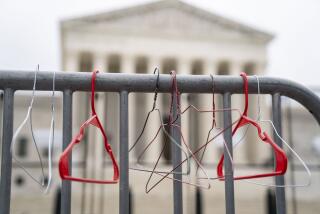Senate Begins Debate on Bush Judicial Pick
- Share via
WASHINGTON — The Senate opened debate Monday on President Bush’s contentious nomination of California Supreme Court Justice Janice Rogers Brown to the federal bench, with Republicans praising her as a “great talent” and Democrats deriding her as a conservative ideologue.
The arguments were familiar ones concerning Brown. First nominated to the federal appeals court for the District of Columbia by Bush in 2003, she was one of several presidential picks Democrats blocked through filibuster threats during his first term. Bush renominated her this year.
Republican Senate leaders wanted to strip Democrats of their right to filibuster judicial nominees until a compromise in late May among centrists in both parties cleared the way for votes on some of the disputed nominees, including Brown.
A vote to end debate on Brown, known as cloture, is expected today, and Brown’s confirmation vote could come as early as Wednesday.
Senate Majority Leader Bill Frist (R-Tenn.) on Monday said Brown, the first African American woman to serve on the California Supreme Court, rose to the top of the legal profession through “great achievement and great talent.”
Frist noted that Brown was the daughter of an Alabama sharecropper. Her father also spent much of his career in the Air Force.
“After being delayed for two years by partisan obstruction,” Brown’s nomination “will finally get an up-or-down vote, which she deserves,” Frist said.
Democrats, even as they took note of the agreement to end the filibuster of Brown, urged senators to vote against her confirmation, based on her legal record.
Sen. Barbara Boxer (D-Calif.) said Brown had an extremely limited view of government regulation in opinions that argued for rolling back Social Security programs or zoning ordinances.
“It’s not her life that I attack when I say I’m not for Janice Rogers Brown. It’s what she will do to your life,” Boxer said, referring to the public.
She added, “Packing the courts with people like this will set our country back.”
Brown’s nomination is opposed by most African American members of Congress, all of whom are Democrats.
“Both in her court decisions and in her many writings, Ms. Brown rejects the civil rights remedies Congress has enacted and that the courts have approved ... and believes that parts of ... the 1964 Civil Rights Act are unconstitutional,” Rep. Melvin L. Watt (D-N.C.), chairman of the Congressional Black Caucus, said in a statement.
At a news conference, Senate Minority Leader Harry Reid (D-Nev.) accused Bush of entangling Congress in a conflict over judicial nominations by sending the Senate controversial nominees such as Brown instead of consensus candidates.
“This whole legislative year, we have yet to spend a single minute debating healthcare, debating education, debating the environment, debating the things that people in America feel are important,” Reid said. “That’s too bad. These radical judges don’t deserve the attention that these other issues do.”
Republicans have responded to such criticism by accusing Democrats of unfairly using the filibuster to thwart Bush and a GOP-controlled Senate from filling vacancies on the federal bench.
The controversy over confirming federal judges appears to have taken a toll on the public’s approval of Congress.
In a Gallup poll released Monday, 22% of respondents said they had “a great deal” or “quite a lot” of confidence in Congress -- the lowest rating since 1997 and down from 30% last year.
Fifty-one percent of respondents said they had “some” confidence, and 26% said they had “very little” or “none.”
Gallup said Congress ranked with big business and organized labor among 15 institutions tested, and was only slightly better than health maintenance organizations, the lowest-rated institution. The poll of 1,000 adults had a margin of error of 3 percentage points.
More to Read
Get the L.A. Times Politics newsletter
Deeply reported insights into legislation, politics and policy from Sacramento, Washington and beyond. In your inbox twice per week.
You may occasionally receive promotional content from the Los Angeles Times.










